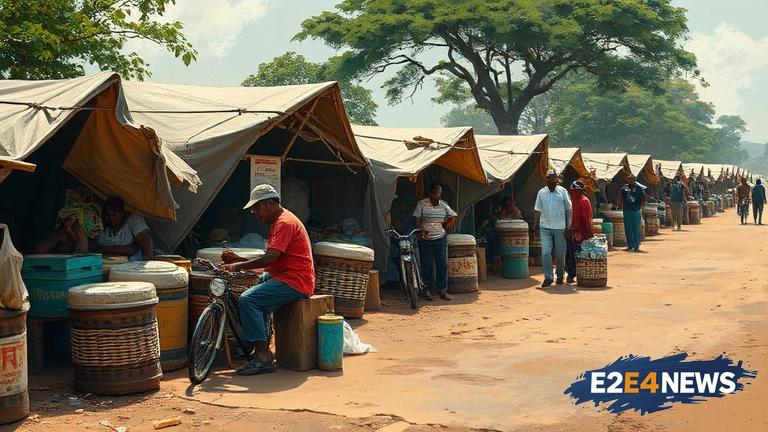The Zimbabwean government has embarked on a mission to rid the streets of informal traders, citing concerns over the spread of diseases and the need to restore order in the capital city, Harare. The move has been met with resistance from the traders, who claim that they are being unfairly targeted and that their livelihoods are being threatened. The government has argued that the informal traders are operating outside of the law and that their activities are contributing to the country’s economic woes. However, the traders argue that they are simply trying to make a living in a country where formal employment opportunities are scarce. The crackdown on informal traders is part of a broader effort by the government to address the country’s economic crisis, which has seen the value of the local currency plummet and inflation soar. The government has also introduced a range of other measures, including a new tax on electronic transactions and a ban on the use of foreign currency. The move has been widely criticized, with many arguing that it will only serve to further exacerbate the economic crisis. The informal traders, who are estimated to number in the hundreds of thousands, are a vital part of the country’s economy, providing goods and services to many Zimbabweans who cannot afford to shop at formal retail outlets. Despite the challenges they face, the traders remain defiant, with many vowing to continue operating despite the government’s crackdown. The government’s actions have also been criticized by human rights groups, who argue that they are an attack on the rights of poor and vulnerable Zimbabweans. The situation has been further complicated by the fact that many of the informal traders are women, who are often the sole breadwinners in their families. The government’s crackdown has also raised concerns about the potential for social unrest, with many fearing that the move could spark widespread protests. The economic crisis in Zimbabwe has been ongoing for many years, with the country struggling to recover from a series of economic shocks, including hyperinflation and a decline in agricultural production. The government has introduced a range of measures to try and address the crisis, including a new economic plan and a series of reforms aimed at attracting foreign investment. However, the situation remains dire, with many Zimbabweans struggling to access basic necessities like food and healthcare. The crackdown on informal traders is just the latest in a series of moves by the government to try and assert control over the economy. The government has also been criticized for its handling of the crisis, with many arguing that it has failed to take adequate steps to address the root causes of the problem. The situation in Zimbabwe is being closely watched by the international community, with many fearing that the country could be on the brink of a major crisis. The government’s actions have also been condemned by the opposition, who argue that they are an attack on the rights of Zimbabweans and an attempt to suppress dissent. The crackdown on informal traders is a complex issue, with many different factors at play. While the government argues that it is necessary to restore order and boost the economy, the traders and their supporters argue that it is an attack on their livelihoods and their rights. The situation is likely to continue to evolve in the coming days and weeks, with many fearing that it could have major consequences for the country and its people. The government’s actions have also raised concerns about the potential for corruption, with many arguing that the crackdown is being used as a pretext to target certain groups and individuals. The situation in Zimbabwe is a reminder of the challenges faced by many countries in the region, where economic instability and political unrest are common. The government’s handling of the crisis has been widely criticized, with many arguing that it has failed to take adequate steps to address the root causes of the problem. The crackdown on informal traders is just one example of the many challenges faced by Zimbabweans, who are struggling to survive in a country where the economy is in crisis and the government is increasingly authoritarian. The situation is a major concern for the international community, which is watching events in Zimbabwe with growing alarm. The government’s actions have also been condemned by human rights groups, who argue that they are an attack on the rights of poor and vulnerable Zimbabweans. The crackdown on informal traders is a major issue, with many different factors at play. While the government argues that it is necessary to restore order and boost the economy, the traders and their supporters argue that it is an attack on their livelihoods and their rights. The situation is likely to continue to evolve in the coming days and weeks, with many fearing that it could have major consequences for the country and its people.
